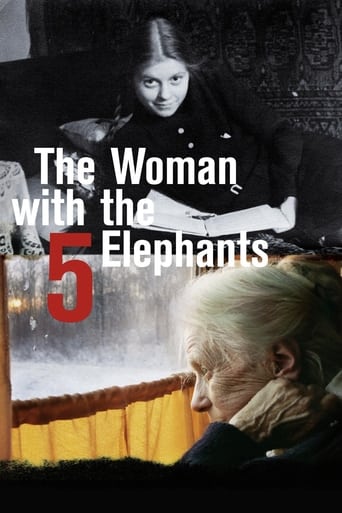Horst in Translation ([email protected])
"Die Frau mit den 5 Elefanten" or "The Woman with the 5 Elephants" is a German/Swiss documentary movie from 2009, so this one has its 10th anniversary next year. Thanks to the awards recognition it received, it is until now probably still the most known work by writer and director Vadim Jendreyko. And thanks to his own background as well as due to the protagonist's background (in terms of both nationality and profession), there are several parts in Russian in here, even if the central language is still German. It runs for slightly over 1.5 hours, including credits and the focus here is on Svetlana Geier, who tells us about her life during the German invasion during World War II, but also about a lot that happened later to her. Sadly she died shortly after this film was made, but she was at a pretty old age already in here. So these are the basics and as it felt pretty generic for a documentary on the subject that it is about, there are informative moments and sequences nonetheless. I personally preferred the old footage from back in the day and the recordings with a lot of snow to be seen. Both, especially the former, could have been more frequent in the first 45 minutes of the film I would say, but it is still not bad by any means, just an attempt by me to describe why I enjoyed the second half more than the parts early on. As for Geier herself I guess her life was interesting enough and significant enough to justify a documentary movie being made about her, especially her earlier years, and the success speaks for itself in terms of ratings and receptions. If you take a look at the subject, then you should be able yourself to decide whether this is a movie you want to see. The subject is definitely not for everybody, but it can be a pretty rewarding watch if it appeals to you, maybe even more rewarding than it was for me who would describe the overall outcome as good, but not great. Still I give this one a thumbs-up all in all and I definitely think it is worth checking out. One final note: Don't be fooled by the animals in the title, the elephants in the room because this is at no point a nature documentary, so if you are looking for that, go for something else instead. That's all folks.
